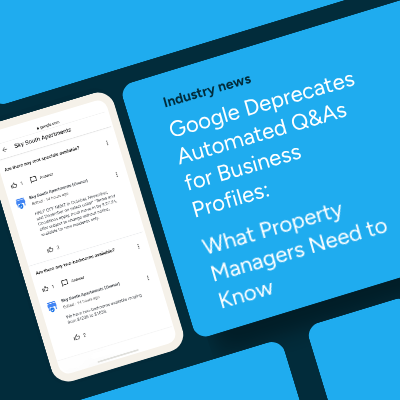
Taylor Swift isn’t the only one with a big reputation. In fact, many multifamily communities and management firms rely on their online reputations to help earn more tours and leases to fill their vacant units. And with the increased ease of leaving and finding reviews online and on social media, it’s more important than ever for property management companies to take a holistic approach to managing their online reputations. Here, we break down the four pillars of reputation management, outline the benefits, and share tips on how to use each method.
Review monitoring
Review monitoring (otherwise known as Review Listening) is used to track and analyze what residents and prospective renters are saying about your communities online. This includes reviews on popular platforms such as Google, Yelp, ApartmentRatings, Facebook, and more. By keeping a close eye on these platforms, property managers can gain insights into renter satisfaction, identify common areas for improvement, and spot trends in feedback.
How to use it
- Set up alerts with tools like Google Alerts, Mention, etc. to get real-time notifications when your property is mentioned online. This ensures you’re always aware of new reviews as they appear.
- Monitor the volume and sentiment of reviews over time by looking for patterns that indicate areas for improvement or highlight successful aspects of your communities and management.
- Regularly check how in on how your competitors are performing as well. Understanding their strengths and weaknesses can help you identify opportunities to make your properties stand out.
Benefits
- Being informed about what renters are saying helps you identify and address areas for improvement within your communities to better meet renter expectations and needs.
- Using trends found within review sentiments allows you to make data-informed decisions to improve and better strategize your marketing efforts.
Review response
Responding to reviews, both positive and negative, shows care about what residents have to say. And a timely response shows prospective renters that you value feedback and are proactive in addressing concerns.
How to use it
- For positive reviews, thank residents for their feedback and highlight specific points they noted in their review. This reinforces the positive aspects of your property.
- For negative reviews, acknowledge the renter’s concern or frustration, and offer a solution or explanation. Apologize if the concern is legitimate, and provide a contact method for further discussion. This shows that you’re responsive and committed to resolving problems.
- Maintain a courteous and professional tone in all responses. Avoid becoming defensive or engaging in arguments.
Benefits
- Responding to reviews shows you care about your residents their feedback, which helps build trust among current and prospective renters. In fact, 63% of renters feel companies really care about their residents when they respond to online reviews.1
- Responding also demonstrates your community values providing good customer service. According to SatisFacts’ Biennial Online Renter Study, 72% of renters feel companies have great customer service when they respond to online reviews.1
Removing negative, illegitimate reviews
Removing reviews that are both negative and illegitimate or irrelevant is an essential aspect of reputation management. While it’s important to address genuine negative feedback, it’s just as important to protect your property’s reputation from false or misleading reviews.
How to use it
- Determine whether a review violates the review platform’s policies, is spam, or is written by someone who has not stayed at your property.
- Report the illegitimate reviews. Most review platforms have processes for reporting fraudulent or invalid reviews. Check each platform to understand what they classify as an invalid or illegitimate review.
- After reporting, follow up to ensure the review is removed or rectified. If you see a review was incorrectly deemed legitimate, you can appeal the decision with the platform directly.
- Continue monitoring your reviews. New, invalid reviews appear daily across platforms. It’s vital you continue monitoring those reviews regularly to avoid your online reputation being illegitimately, negatively impacted.
Benefits
- Ensures that your property’s online reputation reflects genuine renter experiences.
- Minimizes the impact of false information on prospective renters’ perceptions.
- Helps maintain a high star rating by removing invalid, negative reviews.
Read more about flagging invalid reviews on our blog post here.
Requesting new reviews
Actively requesting new reviews from residents and prospects who have toured or leased at your community is a proactive approach to building a positive online reputation. Positive reviews can help offset any negative feedback and boost your property’s overall star ratings.
Did you know? Nearly 64% of renters say they would leave a review if asked.1
How to use it
- Request reviews shortly after residents or prospects who have completed a key milestone, such as after a property tour, signing a new lease, or renewing an existing lease.
- Make it easy for renters to leave reviews by providing direct links to review sites and clear instructions. You can do this with QR codes placed within your front office, by sending email requests, or even sending text messages with links to the review platform of your choice.
- Consider offering incentives, like discounts or entry into a prize draw, to encourage more renters to leave reviews.
Benefits
- A higher volume of positive reviews improves your property’s rating and appeal.
- More, positive reviews can improve your property’s search engine rankings, making it more visible to prospective renters.
Integrating it all together
To effectively manage your property’s online reputation, integrate these pillars into a cohesive strategy:
- Establish a routine for monitoring reviews, responding to feedback, and handling issues. Assign specific team members (either onsite or at the management firm level) to manage these tasks.
- Ensure your team is trained in best practices for reputation management. This includes how to respond to online reviews professionally and efficiently.
- Regularly assess the effectiveness of your reputation management strategy. Analyze metrics such as review ratings, resident sentiments, and overall online star ratings to determine if adjustments are needed.
Additionally, you can leverage reputation management solutions to streamline these processes. In fact, Zumper offers a suite of reputation management solutions that automate each of these methods, such as removing negative, invalid reviews, tracking sentiments from your online reviews, automating responses to new reviews left on Facebook and Google, and even requesting new reviews on your behalf from residents and prospects who have toured, leased, or renewed.
Ready to get started? Visit multifamily.zumper.com to learn how.
Source: 1. SatisFacts Biennial Online Renter Survey, January 2024



